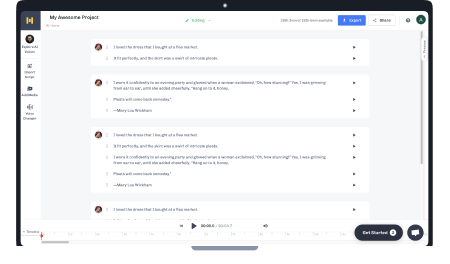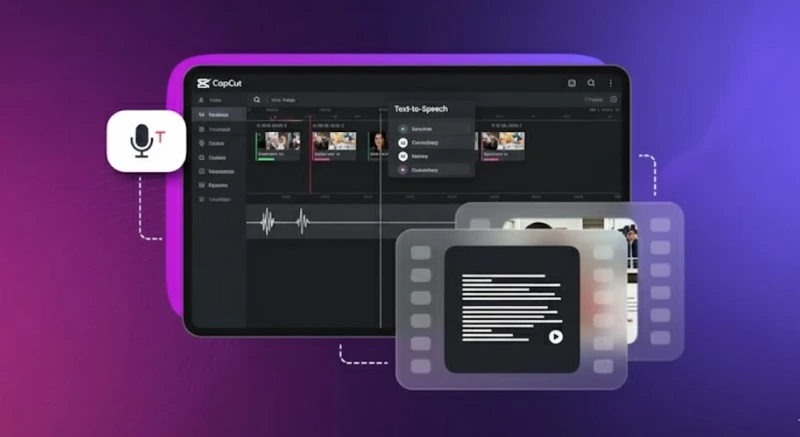AI Audiobook Narration: The Future of Storytelling?

Imagine a world where the stories you love come alive with crystal clear, lifelike narration. No more boring, monotonous voices or robotic inflections. Instead, you are transported into the heart of the story, as the characters and their emotions are brought to life with rich, nuanced performances, and the story unfolds in a way that is both captivating and immersive. With AI audiobook narration, this future is now a reality!
Rapid advancements in AI have opened up the potential for more nuanced and 'human-like' narration. AI voices now sound much more natural than digitally generated voices, leading to fears that they could replace human narrators altogether. And, that possibility received a major expansion in early January from Apple after it announced a new AI-powered digital narration service for audiobooks.
Apple launched four new AI voices, 'Madison' and 'Jackson' optimized for romance and fiction genres and 'Helena' and 'Mitchell' for nonfiction, aiming to make the creation of audiobooks more accessible to all. The service is currently available only in English, and users can find the audiobooks listed in the Books app as "Narrated by Apple Books." Apple Books' digital narration leverages advanced speech synthesis technology to produce high-quality audiobooks from an ebook file. The tech giant has long been on the forefront of innovative speech technology, and has now adapted it for long-form reading, working alongside publishers, authors, and narrators. Through this new feature, Apple remains committed to celebrating and showcasing the magic of human narration and will continue to grow its AI-narrated audiobook catalog.
The Shift in Audiobook Production
Audiobooks are a lucrative and fast-growing market. Their sales and popularity have skyrocketed in recent years, with technology companies scrambling to gain a foothold. Industry insiders believe the global market will be worth more than $35bn by 2030. Driving this rapid surge is the traditional time-consuming and cost-intensive process of producing audiobooks with human voice actors.
The current audiobook model involves authors narrating their own books or commissioning professional voice actors to record the audio version of their books. This process can take weeks and cost thousands for a publisher. For independent authors, especially those just starting out, funding such a production can be challenging. AI narration promises to significantly cut these costs and allow smaller publishers and authors to put out an audiobook in the market at a competitive price.
Today, there are several text to speech software out in the market that help users produce AI-narrated audiobooks using synthetic voices at a fraction of the cost and time it takes to do so manually. Among them is Murf, an AI voice generator that enables authors and publishers to create audiobooks using 200+ natural-sounding AI voices across 20+ languages and multiple different accents.
Creating an audiobook with Murf only takes minutes. Upload your script or the text version of your book to Murf's text editor, choose AI voices for different characters in your story, use Murf's voice customization options such as speed, pitch, and volume to fine-tune the narration, include background music to add more depth to the storytelling, and render. Bingo! Your studio-quality audiobook is ready for rollout, in no time. You don't have to invest in costly recording equipment or hire a professional audiobook narrator. Additionally, with Murf's voice cloning service, self-published authors can create an AI voice clone of their own voice and use it to produce their audiobooks.
There are millions of books out there that aren't available to individuals with disabilities, making it difficult or impossible for them to read ebooks or print books. The addition of easy-to-produce audio versions opens up a wealth of content. Through software like Murf, authors can bring audio to as many books and as many people as possible.
The Future of Audiobooks
Apple's approach to digital narration is not a first of its kind. Several other tech companies, including Google and Spotify, have also been investing in making audiobooks a key pillar of their streaming service. However, Apple's latest move has led to a substantial change in the audiobook industry. With more and more book lovers listening to audiobooks, the demand for AI-generated audiobooks will increase. This, in turn, will lead to more investments in the development of AI narration technology to further improve its quality and make it more widely available. Other outcomes of Apple's entry into the market include:
- Intense competition, which would result in lower prices for audiobooks, potentially making them more accessible to a wider range of consumers
- Increased collaboration between tech companies and traditional audiobook publishers, contributing to new and innovative products that combine the strengths of both industries.
It's undeniable that AI will have a big role in future audiobooks. Instead of taking weeks to record, edit, and produce a book, it can be done in a day. By creating an audiobook version of their titles, authors can not only earn a potential income but also the opportunity to build their brand and following while the market is still growing. AI narration gives a chance to all those new books that aren't licensed for audio due to the cost of production, overlooked backlists, and books in minority languages to find a voice, literally.
As AI narration continues to evolve, it will be exciting to see how it will change the way we experience audiobooks and storytelling. Whether it's through the seamless integration of text to speech technology with our devices or the creation of new, more immersive storytelling experiences, the possibilities are endless.






.webp)


.webp)






